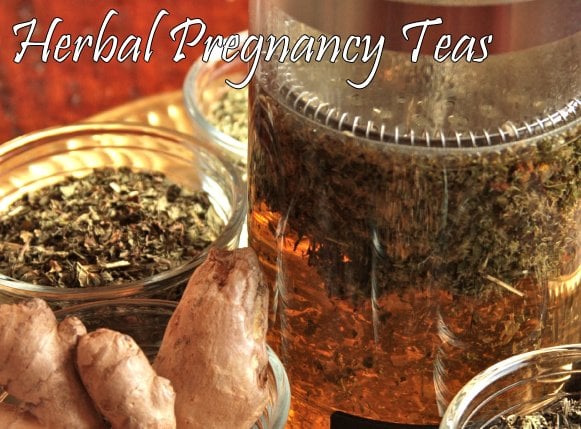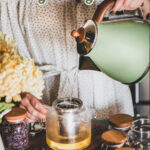Nourishing Herbal Pregnancy Tea Recipes
Sometimes a cup of herbal tea is as good for your soul as it is your body. And just one cup of this nourishing, herbal pregnancy tea has the same vitamin and mineral content as a bowl of dark, leafy greens!
Herbs can be used to soothe the agonizing nausea that so commonly plagues the first trimester. Many herbs are powerhouses of vitamins and minerals that can help strengthen uterine muscles, relieve fluid retention, and relax those nerves.
The herbal infusions in these pregnancy tea blends all support overall wellness and women’s health. And specifically herbs like red raspberry leaf, nettle, and alfalfa are extremely beneficial for pregnant women.
The Best Herbs for Pregnancy Tea
You might recognize these from our guide to the top herbs for fertility. It makes sense that the same herbs that prepare the body for pregnancy will work to support the body during the pregnancy. That’s why the make the perfect base for your pregnancy tea recipes.
Red Raspberry Leaf Benefits
Studies show this herb acts as a uterine tonic and strengthens the uterine wall. The leaves also have astringent properties, which may help contract external and internal body tissues, potentially preventing excessive bleeding in the body.
Red raspberry leaf is rich in nutrients like calcium, iron, and B vitamins.
Alfalfa Benefits
High in vitamin C, E, and K alfalfa is a super-food, used to treat a wide variety of health conditions. Alfalfa’s high mineral content gives the entire body a boost and can help with the chronic fatigue that often comes with pregnancy.
Nettle Leaf Benefits
Nettle also acts as a uterine tonic helping to strengthen and tone the uterus making a great home for a tiny growing baby.
Stinging nettle also has a calming effect on the nervous system and can help reduce stress.
How to Make Your Own Herbal Teas
Once you start making your own herbal tea blends, you might never go back to using bags again.
A daily ritual like making tea – even if it only takes 5 minutes – is a wonderful way to honor your pregnancy. It can also be a form of self care you maintain long term.
Start With Quality Ingredients
Freshly sourced herbs are more potent and have more nutritional value. Organic is also important so you can avoid pesticides during pregnancy. And you might also consider ethically-sourced ingredients if that matters to you.
If you have an herb garden, consider growing some of these medicinal herbs. If that’s a little too ambitious while you’re pregnant, you can find these herbs online or in your local health food store.
Use the Right Tools
There are so many charming and useful teapots available. Find one that’s easy to use and brightens your day or your kitchen.
Use a stainless steel tea infuser or reusable cotton tea bags (cheesecloth will also do) to contain the herbs during the brewing process.
Some people also like to use a coffee press for making herbal teas without the use of disposable filters and bags.
Brew at the Right Temperature
“Some teas should ideally be brewed at a lower temperature than others to get the best flavor,” reports Heidi at Mountain Rose Herbs.
While black and most herbal teas brew best in water between 180-212°F, more delicate tea leaves can burn at that temperature. However, water that is too cool often won’t properly extract the full flavor or constituents from botanicals.
Morning Sickness Tea
This pregnancy tea recipe gives you all the benefits of red raspberry leaf plus the stomach soothing power of ginger and peppermint. If you prefer it a bit more sweet, you can add a pinch of stevia or a teaspoon of local honey.
- 1 Tbsp. red raspberry leaf
- 1 tsp. freshly grated ginger root
- 2 Tbsp. peppermint
- 1 Tbsp. chamomile
Pour boiling water (180-212°F) over loose herbs, let steep for 15-20 minutes and strain (or use an infuser to contain the herbs). Store in a glass jar and drink small amounts frequently throughout the day.
Nourishing Pregnancy Tea
This recipe is one you might add to your postpartum nutrition list. It has so many benefits for women in their childbearing years, it might top the best tea list.
- 1 Tbsp. each of the following herbs:
- red raspberry leaf
- nettle leaf
- peppermint and/or spearmint
- alfalfa
- dandelion leaf
Pour boiling water (180-212°F) over loose herbs, let steep for 15-20 minutes and strain (or use an infuser to contain the herbs). This tea can be enjoyed hot, iced, or frozen into ice cubes and blended into a smoothie.


